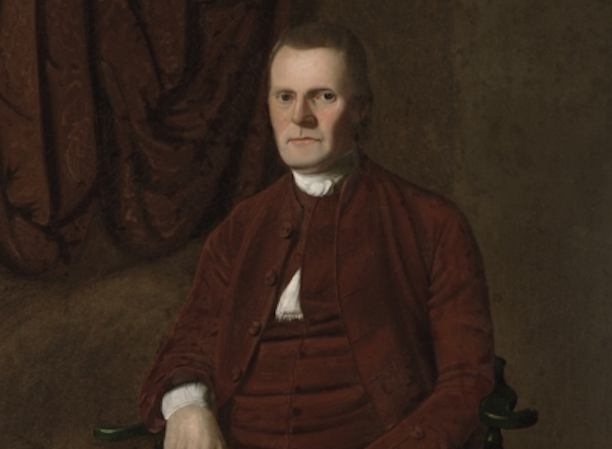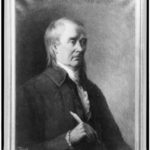Roger Sherman (1721-1793)
Founding Father Roger Sherman helped define the new nation in the last part of the 18th century. Born in Massachusetts, Sherman spent his adult life in Connecticut when, after his father’s death, his mother moved his family to New Milford. He and his brother opened a store in town, and Sherman was the surveyor of New Haven County. Admitted to the Bar in 1754, he served in the Connecticut House of Representatives and the General Assembly. He was elected Mayor of New Haven in 1784 (an office he held until his death), and most noteworthy, Sherman signed of all four major documents of the early United States. Sherman died in 1793 of typhoid fever and was buried in the New Haven Green. In 1821, the city relocated his remains to Grove Street Cemetery, also in New Haven.
Featured
Roger Sherman is also the only person to have signed all four of the most significant documents in our nation’s early history. …[more]
Learn More
58529
MNJDAN2H
1
apsa
50
default
20233
https://connecticuthistory.org/wp-content/plugins/zotpress/
%7B%22status%22%3A%22success%22%2C%22updateneeded%22%3Afalse%2C%22instance%22%3Afalse%2C%22meta%22%3A%7B%22request_last%22%3A0%2C%22request_next%22%3A0%2C%22used_cache%22%3Atrue%7D%2C%22data%22%3A%5B%7B%22key%22%3A%22R3J4C3KJ%22%2C%22library%22%3A%7B%22id%22%3A58529%7D%2C%22meta%22%3A%7B%22lastModifiedByUser%22%3A%7B%22id%22%3A14399323%2C%22username%22%3A%22kquotap%22%2C%22name%22%3A%22%22%2C%22links%22%3A%7B%22alternate%22%3A%7B%22href%22%3A%22https%3A%5C%2F%5C%2Fwww.zotero.org%5C%2Fkquotap%22%2C%22type%22%3A%22text%5C%2Fhtml%22%7D%7D%7D%2C%22numChildren%22%3A0%7D%2C%22bib%22%3A%22%3Cdiv%20class%3D%5C%22csl-bib-body%5C%22%20style%3D%5C%22line-height%3A%201.35%3B%20padding-left%3A%201em%3B%20text-indent%3A-1em%3B%5C%22%3E%5Cn%20%20%3Cdiv%20class%3D%5C%22csl-entry%5C%22%3E%26%23x201C%3BRoger%20Sherman%20Collection.%26%23x201D%3B%20%3Ci%3EConnecticut%20Digital%20Archive%3C%5C%2Fi%3E.%20%3Ca%20class%3D%27zp-ItemURL%27%20href%3D%27https%3A%5C%2F%5C%2Fctdigitalarchive.org%5C%2Fislandora%5C%2Fsearch%5C%2Fmods_titleInfo_title_mt%253A%2528Roger%255C%2520Sherman%2529%2520OR%2520mods_subject_name_personal_namePart_mt%253A%2528Roger%255C%2520Sherman%2529%27%3Ehttps%3A%5C%2F%5C%2Fctdigitalarchive.org%5C%2Fislandora%5C%2Fsearch%5C%2Fmods_titleInfo_title_mt%253A%2528Roger%255C%2520Sherman%2529%2520OR%2520mods_subject_name_personal_namePart_mt%253A%2528Roger%255C%2520Sherman%2529%3C%5C%2Fa%3E.%3C%5C%2Fdiv%3E%5Cn%3C%5C%2Fdiv%3E%22%2C%22data%22%3A%7B%22itemType%22%3A%22webpage%22%2C%22title%22%3A%22Roger%20Sherman%20Collection%22%2C%22creators%22%3A%5B%5D%2C%22abstractNote%22%3A%22%22%2C%22date%22%3A%22%22%2C%22url%22%3A%22https%3A%5C%2F%5C%2Fctdigitalarchive.org%5C%2Fislandora%5C%2Fsearch%5C%2Fmods_titleInfo_title_mt%253A%2528Roger%255C%2520Sherman%2529%2520OR%2520mods_subject_name_personal_namePart_mt%253A%2528Roger%255C%2520Sherman%2529%22%2C%22language%22%3A%22%22%2C%22collections%22%3A%5B%22MNJDAN2H%22%2C%226IUE49QN%22%5D%2C%22dateModified%22%3A%222020-07-13T20%3A22%3A29Z%22%7D%7D%2C%7B%22key%22%3A%22G67G8ZZ7%22%2C%22library%22%3A%7B%22id%22%3A58529%7D%2C%22meta%22%3A%7B%22lastModifiedByUser%22%3A%7B%22id%22%3A14399323%2C%22username%22%3A%22kquotap%22%2C%22name%22%3A%22%22%2C%22links%22%3A%7B%22alternate%22%3A%7B%22href%22%3A%22https%3A%5C%2F%5C%2Fwww.zotero.org%5C%2Fkquotap%22%2C%22type%22%3A%22text%5C%2Fhtml%22%7D%7D%7D%2C%22parsedDate%22%3A%222016%22%2C%22numChildren%22%3A1%7D%2C%22bib%22%3A%22%3Cdiv%20class%3D%5C%22csl-bib-body%5C%22%20style%3D%5C%22line-height%3A%201.35%3B%20padding-left%3A%201em%3B%20text-indent%3A-1em%3B%5C%22%3E%5Cn%20%20%3Cdiv%20class%3D%5C%22csl-entry%5C%22%3E%26%23x201C%3BSherman%20Family%3A%20MSS%20108%20-%20Alphabetical%20Index%20of%20Manuscript%20Collections.%26%23x201D%3B%202016.%20%3Ci%3ENew%20Haven%20Museum%3C%5C%2Fi%3E.%20%3Ca%20class%3D%27zp-ItemURL%27%20href%3D%27http%3A%5C%2F%5C%2Fnewhavenmuseum.org%5C%2Fwp-content%5C%2Fuploads%5C%2F2013%5C%2F06%5C%2FMSS-108-1.pdf%27%3Ehttp%3A%5C%2F%5C%2Fnewhavenmuseum.org%5C%2Fwp-content%5C%2Fuploads%5C%2F2013%5C%2F06%5C%2FMSS-108-1.pdf%3C%5C%2Fa%3E.%3C%5C%2Fdiv%3E%5Cn%3C%5C%2Fdiv%3E%22%2C%22data%22%3A%7B%22itemType%22%3A%22webpage%22%2C%22title%22%3A%22Sherman%20Family%3A%20MSS%20108%20-%20Alphabetical%20Index%20of%20Manuscript%20Collections%22%2C%22creators%22%3A%5B%5D%2C%22abstractNote%22%3A%22%22%2C%22date%22%3A%222016%22%2C%22url%22%3A%22http%3A%5C%2F%5C%2Fnewhavenmuseum.org%5C%2Fwp-content%5C%2Fuploads%5C%2F2013%5C%2F06%5C%2FMSS-108-1.pdf%22%2C%22language%22%3A%22%22%2C%22collections%22%3A%5B%22MNJDAN2H%22%2C%226IUE49QN%22%2C%223BW9C9W2%22%5D%2C%22dateModified%22%3A%222016-12-01T17%3A29%3A09Z%22%7D%7D%2C%7B%22key%22%3A%22ACQRA4RS%22%2C%22library%22%3A%7B%22id%22%3A58529%7D%2C%22meta%22%3A%7B%22lastModifiedByUser%22%3A%7B%22id%22%3A14399323%2C%22username%22%3A%22kquotap%22%2C%22name%22%3A%22%22%2C%22links%22%3A%7B%22alternate%22%3A%7B%22href%22%3A%22https%3A%5C%2F%5C%2Fwww.zotero.org%5C%2Fkquotap%22%2C%22type%22%3A%22text%5C%2Fhtml%22%7D%7D%7D%2C%22creatorSummary%22%3A%22Collier%22%2C%22parsedDate%22%3A%221971%22%2C%22numChildren%22%3A0%7D%2C%22bib%22%3A%22%3Cdiv%20class%3D%5C%22csl-bib-body%5C%22%20style%3D%5C%22line-height%3A%201.35%3B%20padding-left%3A%201em%3B%20text-indent%3A-1em%3B%5C%22%3E%5Cn%20%20%3Cdiv%20class%3D%5C%22csl-entry%5C%22%3ECollier%2C%20Christopher.%201971.%20%3Ci%3ERoger%20Sherman%26%23x2019%3Bs%20Connecticut%3B%20Yankee%20Politics%20and%20the%20American%20Revolution%3C%5C%2Fi%3E.%20Middletown%2C%20CT%3A%20Wesleyan%20University%20Press.%3C%5C%2Fdiv%3E%5Cn%3C%5C%2Fdiv%3E%22%2C%22data%22%3A%7B%22itemType%22%3A%22book%22%2C%22title%22%3A%22Roger%20Sherman%27s%20Connecticut%3B%20Yankee%20Politics%20and%20the%20American%20Revolution%22%2C%22creators%22%3A%5B%7B%22creatorType%22%3A%22author%22%2C%22firstName%22%3A%22Christopher%22%2C%22lastName%22%3A%22Collier%22%7D%5D%2C%22abstractNote%22%3A%22%22%2C%22date%22%3A%221971%22%2C%22language%22%3A%22English%22%2C%22ISBN%22%3A%22%22%2C%22url%22%3A%22%22%2C%22collections%22%3A%5B%22MNJDAN2H%22%2C%22CTGEE4UN%22%2C%22Q46WNT7U%22%2C%227WJ87IR6%22%2C%22ICXTJSXE%22%5D%2C%22dateModified%22%3A%222012-11-12T21%3A18%3A08Z%22%7D%7D%2C%7B%22key%22%3A%227H2XZ6UG%22%2C%22library%22%3A%7B%22id%22%3A58529%7D%2C%22meta%22%3A%7B%22lastModifiedByUser%22%3A%7B%22id%22%3A14399323%2C%22username%22%3A%22kquotap%22%2C%22name%22%3A%22%22%2C%22links%22%3A%7B%22alternate%22%3A%7B%22href%22%3A%22https%3A%5C%2F%5C%2Fwww.zotero.org%5C%2Fkquotap%22%2C%22type%22%3A%22text%5C%2Fhtml%22%7D%7D%7D%2C%22creatorSummary%22%3A%22Paltsits%20and%20Sherman%22%2C%22parsedDate%22%3A%221907%22%2C%22numChildren%22%3A0%7D%2C%22bib%22%3A%22%3Cdiv%20class%3D%5C%22csl-bib-body%5C%22%20style%3D%5C%22line-height%3A%201.35%3B%20padding-left%3A%201em%3B%20text-indent%3A-1em%3B%5C%22%3E%5Cn%20%20%3Cdiv%20class%3D%5C%22csl-entry%5C%22%3EPaltsits%2C%20Victor%20Hugo%2C%20and%20Roger%20Sherman.%201907.%20%3Ci%3EThe%20Almanacs%20of%20Roger%20Sherman%2C%201750-1761%3C%5C%2Fi%3E.%20Worcester%2C%20MA%3A%20The%20Davis%20Press.%20%3Ca%20class%3D%27zp-ItemURL%27%20href%3D%27http%3A%5C%2F%5C%2Farchive.org%5C%2Fstream%5C%2Fcu31924029560632%23page%5C%2Fn3%5C%2Fmode%5C%2F2up%27%3Ehttp%3A%5C%2F%5C%2Farchive.org%5C%2Fstream%5C%2Fcu31924029560632%23page%5C%2Fn3%5C%2Fmode%5C%2F2up%3C%5C%2Fa%3E.%3C%5C%2Fdiv%3E%5Cn%3C%5C%2Fdiv%3E%22%2C%22data%22%3A%7B%22itemType%22%3A%22book%22%2C%22title%22%3A%22The%20Almanacs%20of%20Roger%20Sherman%2C%201750-1761%22%2C%22creators%22%3A%5B%7B%22creatorType%22%3A%22author%22%2C%22firstName%22%3A%22Victor%20Hugo%22%2C%22lastName%22%3A%22Paltsits%22%7D%2C%7B%22creatorType%22%3A%22author%22%2C%22firstName%22%3A%22Roger%22%2C%22lastName%22%3A%22Sherman%22%7D%5D%2C%22abstractNote%22%3A%22%22%2C%22date%22%3A%221907%22%2C%22language%22%3A%22English%22%2C%22ISBN%22%3A%22%22%2C%22url%22%3A%22http%3A%5C%2F%5C%2Farchive.org%5C%2Fstream%5C%2Fcu31924029560632%23page%5C%2Fn3%5C%2Fmode%5C%2F2up%22%2C%22collections%22%3A%5B%22MNJDAN2H%22%2C%227WJ87IR6%22%2C%22ICXTJSXE%22%5D%2C%22dateModified%22%3A%222012-11-12T21%3A18%3A08Z%22%7D%7D%2C%7B%22key%22%3A%22F8EJKBVB%22%2C%22library%22%3A%7B%22id%22%3A58529%7D%2C%22meta%22%3A%7B%22lastModifiedByUser%22%3A%7B%22id%22%3A14399323%2C%22username%22%3A%22kquotap%22%2C%22name%22%3A%22%22%2C%22links%22%3A%7B%22alternate%22%3A%7B%22href%22%3A%22https%3A%5C%2F%5C%2Fwww.zotero.org%5C%2Fkquotap%22%2C%22type%22%3A%22text%5C%2Fhtml%22%7D%7D%7D%2C%22creatorSummary%22%3A%22Boardman%22%2C%22parsedDate%22%3A%221971%22%2C%22numChildren%22%3A0%7D%2C%22bib%22%3A%22%3Cdiv%20class%3D%5C%22csl-bib-body%5C%22%20style%3D%5C%22line-height%3A%201.35%3B%20padding-left%3A%201em%3B%20text-indent%3A-1em%3B%5C%22%3E%5Cn%20%20%3Cdiv%20class%3D%5C%22csl-entry%5C%22%3EBoardman%2C%20Roger%20Sherman.%201971.%20%3Ci%3ERoger%20Sherman%2C%20Signer%20and%20Statesman%3C%5C%2Fi%3E.%20New%20York%2C%20NY%3A%20Da%20Capo%20Press.%3C%5C%2Fdiv%3E%5Cn%3C%5C%2Fdiv%3E%22%2C%22data%22%3A%7B%22itemType%22%3A%22book%22%2C%22title%22%3A%22Roger%20Sherman%2C%20Signer%20and%20Statesman%22%2C%22creators%22%3A%5B%7B%22creatorType%22%3A%22author%22%2C%22firstName%22%3A%22Roger%20Sherman%22%2C%22lastName%22%3A%22Boardman%22%7D%5D%2C%22abstractNote%22%3A%22%22%2C%22date%22%3A%221971%22%2C%22language%22%3A%22English%22%2C%22ISBN%22%3A%220306704129%209780306704123%22%2C%22url%22%3A%22%22%2C%22collections%22%3A%5B%22MNJDAN2H%22%2C%227WJ87IR6%22%2C%22ICXTJSXE%22%5D%2C%22dateModified%22%3A%222012-11-12T21%3A18%3A08Z%22%7D%7D%2C%7B%22key%22%3A%22CPA98TW3%22%2C%22library%22%3A%7B%22id%22%3A58529%7D%2C%22meta%22%3A%7B%22lastModifiedByUser%22%3A%7B%22id%22%3A14399323%2C%22username%22%3A%22kquotap%22%2C%22name%22%3A%22%22%2C%22links%22%3A%7B%22alternate%22%3A%7B%22href%22%3A%22https%3A%5C%2F%5C%2Fwww.zotero.org%5C%2Fkquotap%22%2C%22type%22%3A%22text%5C%2Fhtml%22%7D%7D%7D%2C%22creatorSummary%22%3A%22Rommel%20and%20American%20Revolution%20Bicentennial%20Commission%20of%20Connecticut%22%2C%22parsedDate%22%3A%221979%22%2C%22numChildren%22%3A0%7D%2C%22bib%22%3A%22%3Cdiv%20class%3D%5C%22csl-bib-body%5C%22%20style%3D%5C%22line-height%3A%201.35%3B%20padding-left%3A%201em%3B%20text-indent%3A-1em%3B%5C%22%3E%5Cn%20%20%3Cdiv%20class%3D%5C%22csl-entry%5C%22%3ERommel%2C%20John%20G.%2C%20and%20American%20Revolution%20Bicentennial%20Commission%20of%20Connecticut.%201979.%20%3Ci%3EConnecticut%26%23x2019%3Bs%20Yankee%20Patriot%2C%20Roger%20Sherman%3C%5C%2Fi%3E.%20Hartford%2C%20CT%3A%20American%20Revolution%20Bicentennial%20Commission%20of%20Connecticut.%3C%5C%2Fdiv%3E%5Cn%3C%5C%2Fdiv%3E%22%2C%22data%22%3A%7B%22itemType%22%3A%22book%22%2C%22title%22%3A%22Connecticut%27s%20Yankee%20Patriot%2C%20Roger%20Sherman%22%2C%22creators%22%3A%5B%7B%22creatorType%22%3A%22author%22%2C%22firstName%22%3A%22John%20G.%22%2C%22lastName%22%3A%22Rommel%22%7D%2C%7B%22creatorType%22%3A%22author%22%2C%22name%22%3A%22American%20Revolution%20Bicentennial%20Commission%20of%20Connecticut%22%7D%5D%2C%22abstractNote%22%3A%22%22%2C%22date%22%3A%221979%22%2C%22language%22%3A%22English%22%2C%22ISBN%22%3A%220918676207%209780918676207%22%2C%22url%22%3A%22%22%2C%22collections%22%3A%5B%22MNJDAN2H%22%2C%227WJ87IR6%22%2C%22ICXTJSXE%22%5D%2C%22dateModified%22%3A%222012-11-12T21%3A18%3A08Z%22%7D%7D%2C%7B%22key%22%3A%222QHJQIHP%22%2C%22library%22%3A%7B%22id%22%3A58529%7D%2C%22meta%22%3A%7B%22lastModifiedByUser%22%3A%7B%22id%22%3A14399323%2C%22username%22%3A%22kquotap%22%2C%22name%22%3A%22%22%2C%22links%22%3A%7B%22alternate%22%3A%7B%22href%22%3A%22https%3A%5C%2F%5C%2Fwww.zotero.org%5C%2Fkquotap%22%2C%22type%22%3A%22text%5C%2Fhtml%22%7D%7D%7D%2C%22creatorSummary%22%3A%22Boutell%22%2C%22parsedDate%22%3A%221896%22%2C%22numChildren%22%3A0%7D%2C%22bib%22%3A%22%3Cdiv%20class%3D%5C%22csl-bib-body%5C%22%20style%3D%5C%22line-height%3A%201.35%3B%20padding-left%3A%201em%3B%20text-indent%3A-1em%3B%5C%22%3E%5Cn%20%20%3Cdiv%20class%3D%5C%22csl-entry%5C%22%3EBoutell%2C%20Lewis%20Henry.%201896.%20%3Ci%3EThe%20Life%20of%20Roger%20Sherman%3C%5C%2Fi%3E.%20Chicago%2C%20IL%3A%20A.%20C.%20McClurg%20and%20Company.%20%3Ca%20class%3D%27zp-ItemURL%27%20href%3D%27http%3A%5C%2F%5C%2Farchive.org%5C%2Fstream%5C%2Fliferogersherma01boutgoog%23page%5C%2Fn12%5C%2Fmode%5C%2F2up%27%3Ehttp%3A%5C%2F%5C%2Farchive.org%5C%2Fstream%5C%2Fliferogersherma01boutgoog%23page%5C%2Fn12%5C%2Fmode%5C%2F2up%3C%5C%2Fa%3E.%3C%5C%2Fdiv%3E%5Cn%3C%5C%2Fdiv%3E%22%2C%22data%22%3A%7B%22itemType%22%3A%22book%22%2C%22title%22%3A%22The%20Life%20of%20Roger%20Sherman%22%2C%22creators%22%3A%5B%7B%22creatorType%22%3A%22author%22%2C%22firstName%22%3A%22Lewis%20Henry%22%2C%22lastName%22%3A%22Boutell%22%7D%5D%2C%22abstractNote%22%3A%22%22%2C%22date%22%3A%221896%22%2C%22language%22%3A%22English%22%2C%22ISBN%22%3A%22%22%2C%22url%22%3A%22http%3A%5C%2F%5C%2Farchive.org%5C%2Fstream%5C%2Fliferogersherma01boutgoog%23page%5C%2Fn12%5C%2Fmode%5C%2F2up%22%2C%22collections%22%3A%5B%22MNJDAN2H%22%2C%227WJ87IR6%22%2C%22ICXTJSXE%22%2C%22WMKKG7ZR%22%5D%2C%22dateModified%22%3A%222012-11-12T21%3A18%3A08Z%22%7D%7D%2C%7B%22key%22%3A%22WPM5ZS88%22%2C%22library%22%3A%7B%22id%22%3A58529%7D%2C%22meta%22%3A%7B%22lastModifiedByUser%22%3A%7B%22id%22%3A14399323%2C%22username%22%3A%22kquotap%22%2C%22name%22%3A%22%22%2C%22links%22%3A%7B%22alternate%22%3A%7B%22href%22%3A%22https%3A%5C%2F%5C%2Fwww.zotero.org%5C%2Fkquotap%22%2C%22type%22%3A%22text%5C%2Fhtml%22%7D%7D%7D%2C%22parsedDate%22%3A%222012%22%2C%22numChildren%22%3A1%7D%2C%22bib%22%3A%22%3Cdiv%20class%3D%5C%22csl-bib-body%5C%22%20style%3D%5C%22line-height%3A%201.35%3B%20padding-left%3A%201em%3B%20text-indent%3A-1em%3B%5C%22%3E%5Cn%20%20%3Cdiv%20class%3D%5C%22csl-entry%5C%22%3E%26%23x201C%3BGuide%20to%20the%20Roger%20Sherman%20%281721-1793%29%20Collection.%26%23x201D%3B%202012.%20%3Ci%3EYale%20University%3C%5C%2Fi%3E.%20%3Ca%20class%3D%27zp-ItemURL%27%20href%3D%27http%3A%5C%2F%5C%2Fhdl.handle.net%5C%2F10079%5C%2Ffa%5C%2Fmssa.ms.0447%27%3Ehttp%3A%5C%2F%5C%2Fhdl.handle.net%5C%2F10079%5C%2Ffa%5C%2Fmssa.ms.0447%3C%5C%2Fa%3E%20%28July%2018%2C%202012%29.%3C%5C%2Fdiv%3E%5Cn%3C%5C%2Fdiv%3E%22%2C%22data%22%3A%7B%22itemType%22%3A%22webpage%22%2C%22title%22%3A%22Guide%20to%20the%20Roger%20Sherman%20%281721-1793%29%20Collection%22%2C%22creators%22%3A%5B%5D%2C%22abstractNote%22%3A%22%22%2C%22date%22%3A%222012%22%2C%22url%22%3A%22http%3A%5C%2F%5C%2Fhdl.handle.net%5C%2F10079%5C%2Ffa%5C%2Fmssa.ms.0447%22%2C%22language%22%3A%22English%22%2C%22collections%22%3A%5B%22MNJDAN2H%22%2C%226IUE49QN%22%5D%2C%22dateModified%22%3A%222012-11-12T21%3A18%3A08Z%22%7D%7D%5D%7D
“Sherman Family: MSS 108 - Alphabetical Index of Manuscript Collections.” 2016.
New Haven Museum.
http://newhavenmuseum.org/wp-content/uploads/2013/06/MSS-108-1.pdf.
Collier, Christopher. 1971. Roger Sherman’s Connecticut; Yankee Politics and the American Revolution. Middletown, CT: Wesleyan University Press.
Paltsits, Victor Hugo, and Roger Sherman. 1907.
The Almanacs of Roger Sherman, 1750-1761. Worcester, MA: The Davis Press.
http://archive.org/stream/cu31924029560632#page/n3/mode/2up.
Boardman, Roger Sherman. 1971. Roger Sherman, Signer and Statesman. New York, NY: Da Capo Press.
Rommel, John G., and American Revolution Bicentennial Commission of Connecticut. 1979. Connecticut’s Yankee Patriot, Roger Sherman. Hartford, CT: American Revolution Bicentennial Commission of Connecticut.
Boutell, Lewis Henry. 1896.
The Life of Roger Sherman. Chicago, IL: A. C. McClurg and Company.
http://archive.org/stream/liferogersherma01boutgoog#page/n12/mode/2up.
“Guide to the Roger Sherman (1721-1793) Collection.” 2012.
Yale University.
http://hdl.handle.net/10079/fa/mssa.ms.0447 (July 18, 2012).






